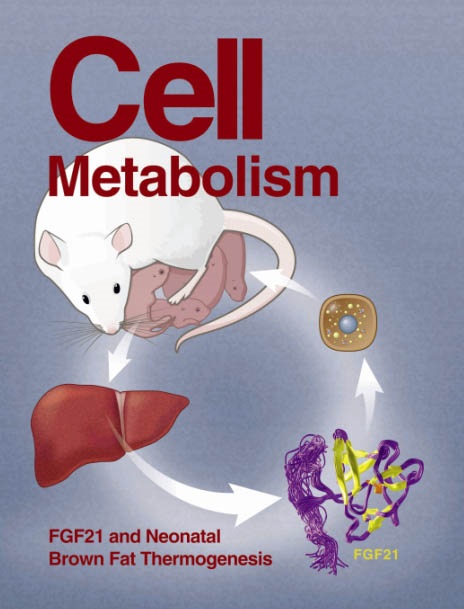Identification of a molecular resistor that controls UCP1-independent Ca2+ cycling thermogenesis in adipose tissue
IF 30.9
1区 生物学
Q1 CELL BIOLOGY
引用次数: 0
Abstract
Adipose tissue thermogenesis contributes to energy balance via mitochondrial uncoupling protein 1 (UCP1) and UCP1-independent pathways. Among UCP1-independent thermogenic mechanisms, one involves Ca2+ cycling via SERCA2b in adipose tissue; however, the underlying molecular basis remains elusive. Here, we report that an endoplasmic reticulum (ER) membrane-anchored peptide, C4orf3 (also known as another regulin [ALN]), uncouples SERCA2b Ca2+ transport from its ATP hydrolysis, rendering the SERCA2b-C4orf3 complex exothermic. Loss of C4orf3/ALN improved the energetic efficiency of SERCA2b-dependent Ca2+ transport without affecting SERCA2 expression, thereby reducing adipose tissue thermogenesis and increasing the adiposity of mice. Notably, genetic depletion of C4orf3 resulted in compensatory activation of UCP1-dependent thermogenesis following cold challenge. We demonstrated that genetic loss of both C4orf3 and Ucp1 additively impaired cold tolerance in vivo. Together, this study identifies C4orf3 as the molecular resistor to SERCA2b-mediated Ca2+ import that plays a key role in UCP1-independent thermogenesis and energy balance.

脂肪组织中控制ucp1独立的Ca2+循环产热的分子电阻的鉴定
脂肪组织产热通过线粒体解偶联蛋白1 (UCP1)和与UCP1无关的途径促进能量平衡。在不依赖于ucp1的产热机制中,一个涉及脂肪组织中通过SERCA2b的Ca2+循环;然而,潜在的分子基础仍然难以捉摸。在这里,我们报道了一种内质网(ER)膜锚定肽,C4orf3(也称为另一种调节蛋白[ALN]),从ATP水解中分离SERCA2b Ca2+转运,使SERCA2b-C4orf3复合体放热。C4orf3/ALN的缺失提高了serca2b依赖性Ca2+运输的能量效率,而不影响SERCA2的表达,从而减少脂肪组织产热,增加小鼠的肥胖。值得注意的是,C4orf3的基因缺失导致冷激后ucp1依赖性产热的代偿性激活。我们证明了C4orf3和Ucp1的遗传缺失会增加体内耐寒性的损害。总之,本研究确定C4orf3是serca2b介导的Ca2+输入的分子电阻,在ucp1不依赖的产热和能量平衡中起关键作用。
本文章由计算机程序翻译,如有差异,请以英文原文为准。
求助全文
约1分钟内获得全文
求助全文
来源期刊

Cell metabolism
生物-内分泌学与代谢
CiteScore
48.60
自引率
1.40%
发文量
173
审稿时长
2.5 months
期刊介绍:
Cell Metabolism is a top research journal established in 2005 that focuses on publishing original and impactful papers in the field of metabolic research.It covers a wide range of topics including diabetes, obesity, cardiovascular biology, aging and stress responses, circadian biology, and many others.
Cell Metabolism aims to contribute to the advancement of metabolic research by providing a platform for the publication and dissemination of high-quality research and thought-provoking articles.
 求助内容:
求助内容: 应助结果提醒方式:
应助结果提醒方式:


